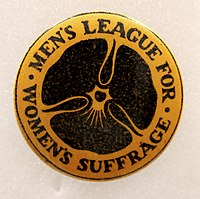
The Women's Social and Political Union (WSPU) was a women-only political movement and leading militant organisation campaigning for women's suffrage in the United Kingdom from 1903 to 1918. Known from 1906 as the suffragettes, its membership and policies were tightly controlled by Emmeline Pankhurst and her daughters Christabel and Sylvia; Sylvia was eventually expelled.

Henry Noel Brailsford was a British journalist and writer, considered one of the most prolific left-wing journalists of the first half of the 20th century. A founding member of the Men's League for Women's Suffrage in 1907, he resigned from his job at The Daily News in 1909 when it supported the force-feeding of suffragettes on hunger strike.

The United Procession of Women, or Mud March as it became known, was a peaceful demonstration in London on 9 February 1907 organised by the National Union of Women's Suffrage Societies (NUWSS) in which more than 3,000 women marched from Hyde Park Corner to the Strand in support of women's suffrage. Women from all classes participated in what was the largest public demonstration supporting women's suffrage seen until then. It acquired the name "Mud March" from the day's weather since incessant heavy rain left the marchers drenched and mud-spattered.

Black Friday was a suffragette demonstration in London on 18 November 1910, in which 300 women marched to the Houses of Parliament as part of their campaign to secure voting rights for women. The day earned its name from the violence meted out to protesters, some of it sexual, by the Metropolitan Police and male bystanders.

A movement to fight for women's right to vote in the United Kingdom finally succeeded through acts of Parliament in 1918 and 1928. It became a national movement in the Victorian era. Women were not explicitly banned from voting in Great Britain until the Reform Act 1832 and the Municipal Corporations Act 1835. In 1872 the fight for women's suffrage became a national movement with the formation of the National Society for Women's Suffrage and later the more influential National Union of Women's Suffrage Societies (NUWSS). As well as in England, women's suffrage movements in Wales, Scotland and other parts of the United Kingdom gained momentum. The movements shifted sentiments in favour of woman suffrage by 1906. It was at this point that the militant campaign began with the formation of the Women's Social and Political Union (WSPU).

Mary Eleanor Gawthorpe was an English suffragette, socialist, trade unionist and editor. She was described by Rebecca West as "a merry militant saint".

A suffragette was a member of an activist women's organisation in the early 20th century who, under the banner "Votes for Women", fought for the right to vote in public elections in the United Kingdom. The term refers in particular to members of the British Women's Social and Political Union (WSPU), a women-only movement founded in 1903 by Emmeline Pankhurst, which engaged in direct action and civil disobedience. In 1906, a reporter writing in the Daily Mail coined the term suffragette for the WSPU, derived from suffragist, in order to belittle the women advocating women's suffrage. The militants embraced the new name, even adopting it for use as the title of the newspaper published by the WSPU.

Theresa Garnett was a British suffragette. She was a serial protester who sometimes went by the name 'Annie O'Sullivan', was jailed and then still refused to cooperate. She assaulted Winston Churchill while carrying a whip. She retired from her militancy after the suffragette movement decided to commit arson as part of its protests. She was honorary editor of a women's right's magazine in 1960.

Una Harriet Ella Stratford Duval was a British suffragette and marriage reformer. Her refusal to say "and obey" in her marriage vows made national news.
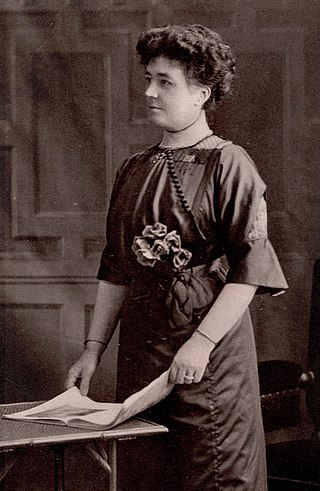
Edith Mansell-Moullin was an English suffragist of Welsh heritage and social activist. Proud of her Welsh roots, she founded the Cymric Suffrage Union, which was dedicated to gaining women's suffrage for Welsh women. She was the co-organizer of the Welsh contingent of the 1911 procession of the Women’s Suffrage Union’s "Great Demonstration" held in 1911 in London. Part of the more militant British suffrage contingent, she was imprisoned for dissidence and refused to stop government agitation during World War I.

Women's suffrage in Wales has historically been marginalised due to the prominence of societies and political groups in England which led the reform for women throughout the United Kingdom. Due to differing social structures and a heavily industrialised working-class society, the growth of a national movement in Wales grew but then stuttered in the late nineteenth century in comparison with that of England. Nevertheless, distinct Welsh groups and individuals rose to prominence and were vocal in the rise of suffrage in Wales and the rest of Great Britain.
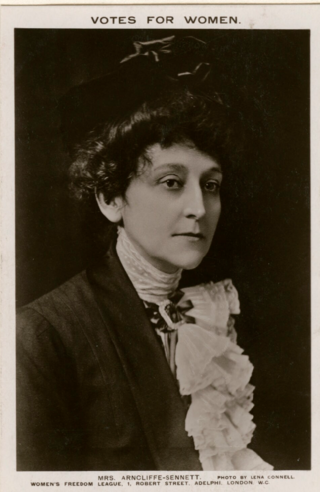
Alice Maud Arncliffe Sennett also known with the stage name of Mary Kingsley was an English actress and suffragist and a suffragette, arrested four times for her activism.
Jane Esdon Brailsford, née Jane Esdon Malloch, was a Scottish suffragette.
Lettice Annie Floyd was a British suffragette. She is known for her openly lesbian relationship with fellow suffragette Annie Williams. Floyd and Williams were arrested and force fed. After the World War I Floyd continued to campaign for women's rights and peace.
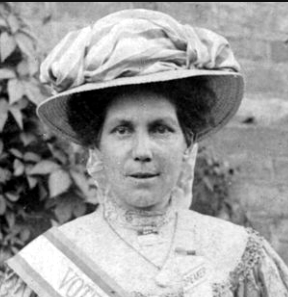
Alice Hawkins was a leading English suffragette among the boot and shoe machinists of Leicester. She went to prison five times for acts committed as part of the Women’s Social and Political Union militant campaign. Her husband Alfred Hawkins was also an active suffragist and received £100 when his kneecap was fractured as he was ejected from a meeting in Bradford. In 2018 a statue of Alice was unveiled in Leicester Market Square.
Jessie Cunningham Methven was a Scottish campaigner for women's suffrage. She was honorary secretary of the Edinburgh National Society for Women's Suffrage from the mid 1890s until 1906. She subsequently joined the more militant Women's Social and Political Union and described herself as an "independent socialist".
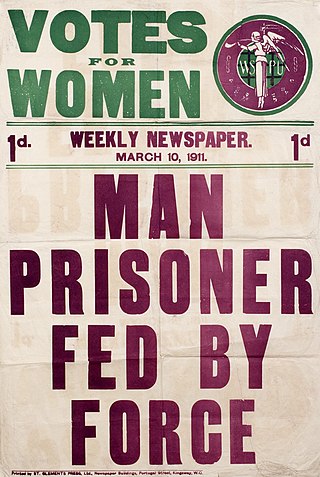
William Ball was a British workers union member, jailed for his support of women's suffrage, and subject of a WSPU pamphlet, "Torture In An English Prison", which described his experience being force-fed such that his health deteriorated and he was sent to a lunatic asylum.
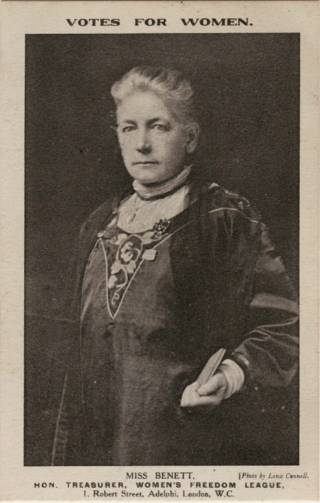
Sarah Barbara Benett was a suffragette, a member of the Women's Social and Political Union (WSPU) and Treasurer of the Women's Freedom League (WFL). She was one of the "Brown Women" who walked from Edinburgh to London in 1912 and went on hunger strike during her imprisonment in Holloway Prison for which she received the WSPU's Hunger Strike Medal and Holloway brooch.

Lilian Hicks (1853–1924) was a British campaigner for the vote for agricultural labourers and later Women's suffrage in the United Kingdom. Hicks took an active role in several organisations and was arrested on Black Friday in 1910.

The Men's Political Union for Women's Enfranchisement (MPU) was a political society founded on 13 January 1910 in the Eustace Miles Restaurant in London as part of the women's suffrage movement in the United Kingdom.
